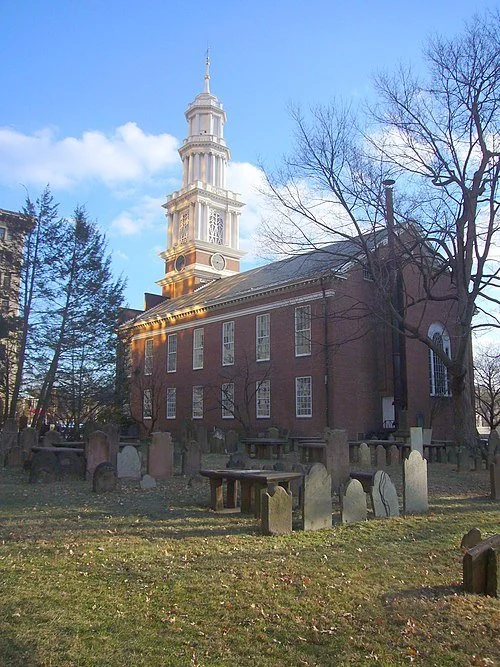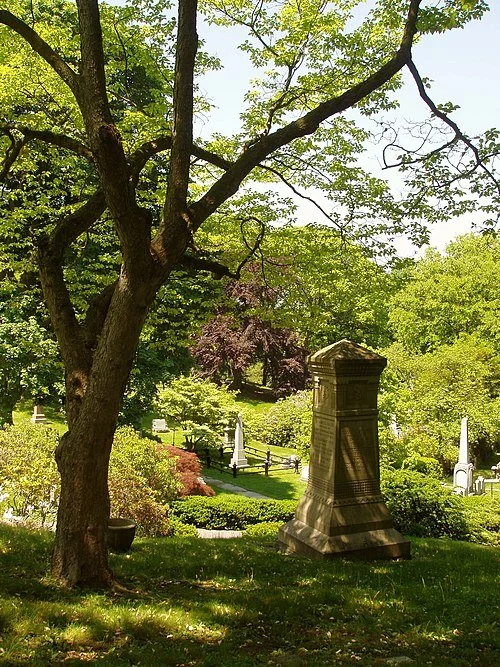
Loathing 'the immigrant swarms’
Immigrants from eastern and southern Europe arriving at Ellis Island, in New York City, in 1915.
Lovecraft’s gravestone in Providence’s beautiful Swan Point Cemetery.
“The ‘Howard’ in the entry had to be {horror, science-fiction and fantasy writer} Howard Phillips Lovecraft {1890-1937}, that twentieth-century puritanic Poe from Providence, with his regrettable but undeniable loathing of the immigrant swarms he felt were threatening the traditions and monuments of his beloved New England and the whole Eastern Seaboard.’’
― Fritz Leiber (1910-1992), American author of fantasy, horror and science- fiction tales, in Our Lady of Darkness
Grave matters
Part of the Ancient Burying Ground in Hartford, with the First Church of Christ (aka Congregational), the congregation's fourth church, built in 1807, next to it. The cemetery, which dates back to 1636, was the city's sole cemetery until 1803.
Adapted from Robert Whitcomb’s “Digital Diary,’’ in GoLocal24
New England Cemeteries: A Collector’s Guide, by Andrew Kull, is extensive (260 places!) and honest. He describes ugly and badly maintained and even abandoned graveyards as well as such grand, gorgeous 19th Century “garden cemeteries’’ as Providence’s Swan Point Cemetery and Mt. Auburn Cemetery, on the Cambridge-Watertown line, just outside of Boston.
Some are ancient, by American standards, with the oldest probably at Cole’s Hill, in Plymouth, Mass. (1620), and King’s Chapel Burying Ground, in Boston, dating to 1630.
Mr. Kull notes:
“People who have never paid much attention to the subject tend to think that one graveyard is much like another. In some parts of the country this is undoubtedly the case. In New England, a longer history has included changing attitudes toward death and its proper commemoration.’’
I love some of the gravestone inscriptions Mr. Kull quotes, such as this on the grave of Samuel Stone (who died in 1663) in Hartford’s Ancient Burying Ground (1636):
“Errors corrupt by sinnewous dispute
He did oppugne, and clearly them confute:
Above all things, he Christ his Lord prefer’d
Hartford! Thy richest jewel’s here interd.’’
This book was published way back in 1975 but I think it still holds up as a guide to many places, lovely or not, that inspire reflection about transitory lives and the sweep of history. Vermont native Mr. Kull (also a distinguished legal scholar) was born in 1947. But he isn’t yet a resident of a cemetery.
In Mt. Auburn Cemetery
Home for good
— Photos by Lydia Whitcomb
In the Hope Memorial Garden, in Swan Point Cemetery, Providence. The focal point of the garden is this sculpture of granite monoliths as a backdrop for an 18th Century anchor recovered from Narragansett Bay. It was designed by Brown University art professor Richard Fishman.
The 18th and early 19th centuries were the heyday of Rhode Island’s maritime trade.
The sculpture was originally installed at an outdoor chapel on Providence’s Killingly Street in 1972 and was moved to Swan Point in 1976.
The anchor is a symbol of homecoming in many places and especially in coastal New England, with its historic connections to the sea. The anchor is a symbol of hope and of Rhode Island, whose flag and seal it graces. But you see a lot of anchors in many New England cemeteries, some positioned in rather strange ways, as below, also at Swan Point.
They’re happy they’re wild
Wild turkeys gather to discuss Indian Summer at Swan Point Cemetery, in Providence. No shooting allowed.
— NED photo
The worst fear
H.P. Lovecraft’s grave in Providence’s famous Swan Point Cemetery
“The oldest and strongest emotion of mankind is fear, and the oldest and strongest kind of fear is fear of the unknown.’’
— H.P. Lovecraft, Providence-based writer of science fiction and horror stories.
Ecologically friendly burials
Adapted from Robert Whitcomb’s “Digital Diary,’’ in GoLocal24.com
Having long thought that expensive coffins and other accoutrements of human burials are a waste of money and not particularly good for the environment (I’ve had somewhat awkward arguments about this with relatives after family deaths) I applaud this week’s opening of “The Ellipse,’’ at beautiful Swan Point Cemetery, on Providence’s East Side. This will be an area for burials in which, the cemetery administration says, “a
process is followed by which all elements going into the earth are biodegradable, ‘’ most especially, of course, the corpses. Hold the preservatives and the metal coffin handles!
(But cremation is the neatest way to go.)
Of course, except in those rare families with strong genealogical interests, knowledge of, and interest in, our ancestors is pretty much nonexistent beyond our grandparents’ generation. We fade into the past remarkably fast.
I do like visiting Oak Grove Cemetery in Falmouth, Mass., which was founded in 1848 but includes the remains of plenty of 18th Century (and maybe even late 17th Century) people moved there from family graveyards. In a sign of how stable small-town life was in those days, there are dozens of what’s left of my ancestors there, including some recent entrants. I was mildly disappointed to learn that there’s no room left for myself and my immediate family. But then I thought: Why take up room?
Katherine Lee Bates, who wrote the lyrics for “American the Beautiful,’’ is buried in Oak Grove.















